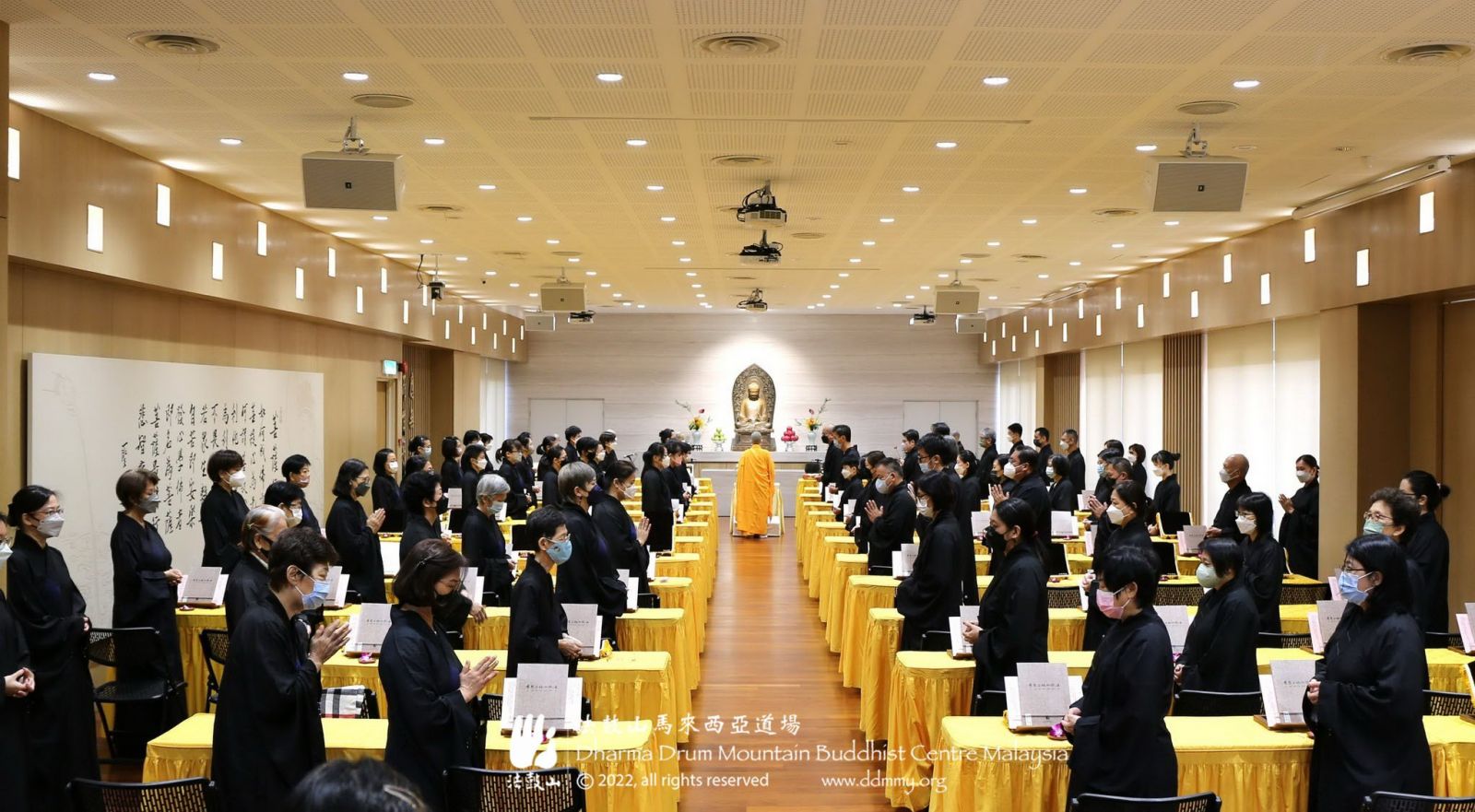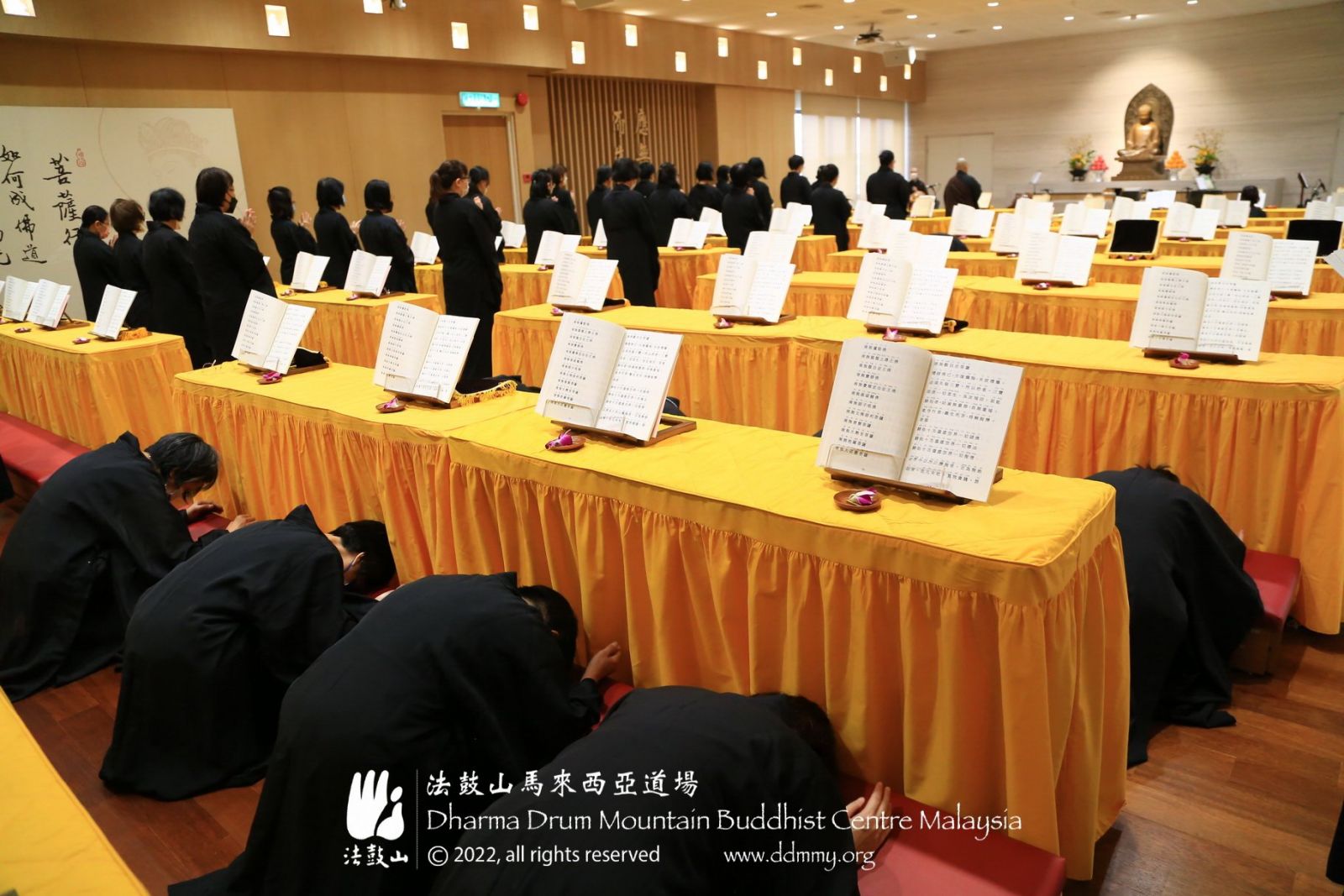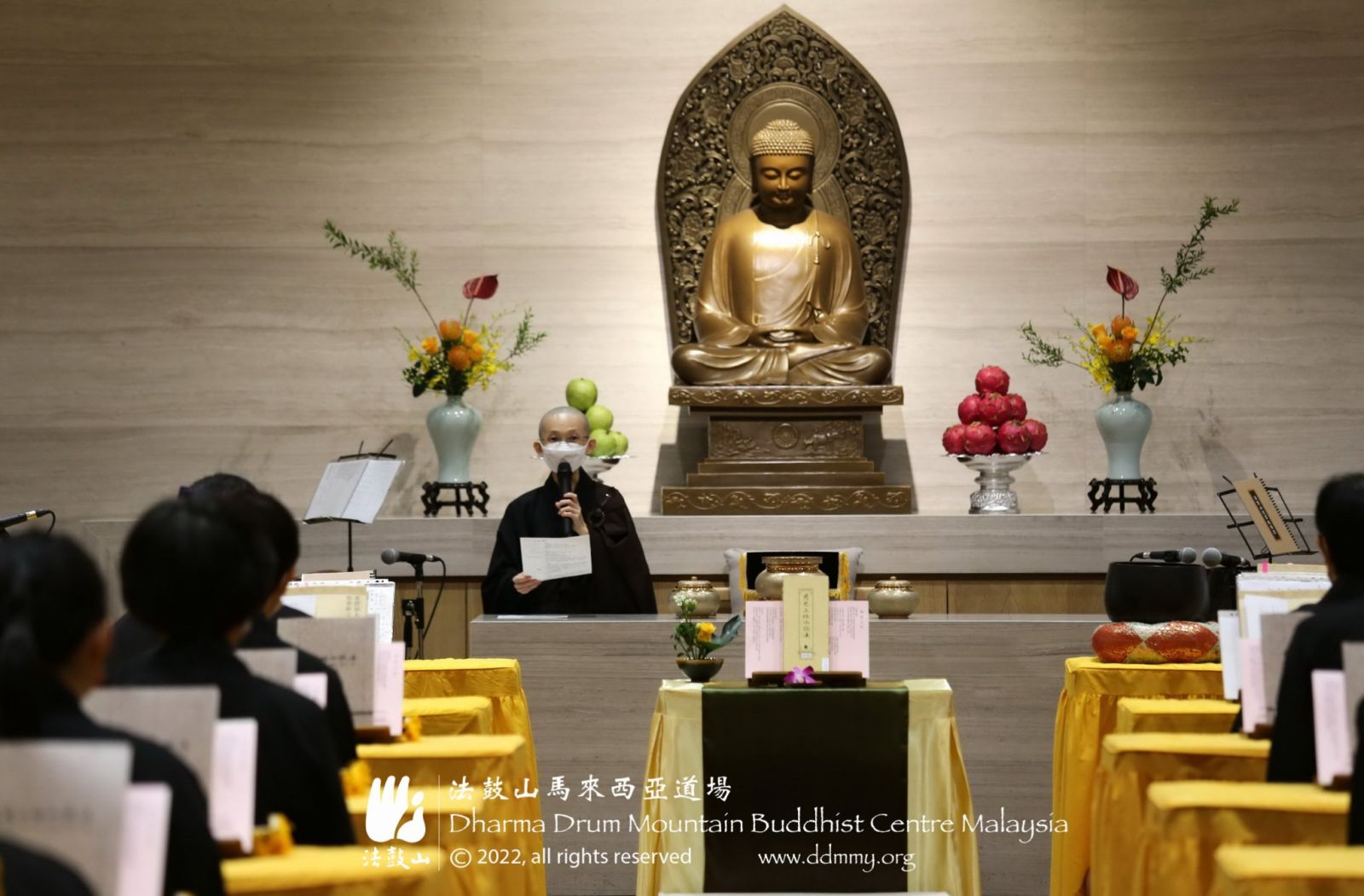DDM Global News
Water Repentance Ceremony: Dharma Drum Mountain Buddhist Centre Malaysia holds its first in-person Dharma assembly since onset of pandemic
Updated September 16, 2022
Dharma Drum Mountain Buddhist Centre Malaysia organized a Cooling and Calming Dharma Water: Compassion Samadhi Water Repentance Dharma assembly from August 20 to 21. Nearly 2000 devotees participated in this group practice event either online or in person at the center, and devotedly practiced the repentance prostration ritual. The fact that this event takes place in July on the lunar calendar known as the "filial month" makes it all the more meaningful to repay the kindness of our deceased parents and ancestors by attending a deliverance service, as well as pray for blessings and the elimination of misfortune for our own family and friends.
 "Chan-hui" (repentance-contrition) is a Buddhist term, with "chan" being a transliteration of the Sanskrit word "kṣamā", and "hui", a Chinese character for its Sanskrit counterpart "āpattipratideśana", meaning to express remorse for our misdeeds. This term originated from ancient India, in the Buddha's teaching. In her Dharma talk, Ven. Chang Zao, director of the center and the presiding monastic for the assembly, remarked, "Repentance is not only about confessing our wrongdoings, but, more importantly, is meant for us to make a resolution as to what we should do next to improve ourselves. This is the true purpose of repentance." In the pre-practice section prior to the main repentance text, there are citations of the aspirations and merits of Samantabhadra Bodhisattva, the bodhisattva known for his constant and ceaseless practice of repenting the three karmas— bodily, verbal, and mental —as well as his teaching on the method for cultivating purity of the six sense faculties. Therefore, the method of repentance practice has always been attributed to Samantabhadra Bodhisattva, a role model for practitioners to follow. To practice repentance and contrition is also to realize Protecting the Spiritual Environment, a campaign initiated by DDM founder Master Sheng Yen. The idea is to encourage us to observe and reflect on our minds, as well as emulate the spirit of a bodhisattva to act for the benefit of people whom we come into contact with. Ven. Chang Zao explained that to "attain calm and serenity by practicing repentance prostration" does not guarantee that you will have no karmic retribution in the future. Rather, the practice helps purify our minds, enabling us not to be vexed when facing our karmic consequences. On our path of Dharma practice, we will inevitably experience ups and downs, but "when we feel troubled, we must carefully observe how our six sense faculties, when coming into contact with the six sense objects, give rise to our upside-down views and illusory self-attachment." As long as we can always have our mind return to the Buddha-dharma, we'll be able to transform our afflictions into provisions for our practice, thus becoming less easily turned around by the influence of external circumstances.
"Chan-hui" (repentance-contrition) is a Buddhist term, with "chan" being a transliteration of the Sanskrit word "kṣamā", and "hui", a Chinese character for its Sanskrit counterpart "āpattipratideśana", meaning to express remorse for our misdeeds. This term originated from ancient India, in the Buddha's teaching. In her Dharma talk, Ven. Chang Zao, director of the center and the presiding monastic for the assembly, remarked, "Repentance is not only about confessing our wrongdoings, but, more importantly, is meant for us to make a resolution as to what we should do next to improve ourselves. This is the true purpose of repentance." In the pre-practice section prior to the main repentance text, there are citations of the aspirations and merits of Samantabhadra Bodhisattva, the bodhisattva known for his constant and ceaseless practice of repenting the three karmas— bodily, verbal, and mental —as well as his teaching on the method for cultivating purity of the six sense faculties. Therefore, the method of repentance practice has always been attributed to Samantabhadra Bodhisattva, a role model for practitioners to follow. To practice repentance and contrition is also to realize Protecting the Spiritual Environment, a campaign initiated by DDM founder Master Sheng Yen. The idea is to encourage us to observe and reflect on our minds, as well as emulate the spirit of a bodhisattva to act for the benefit of people whom we come into contact with. Ven. Chang Zao explained that to "attain calm and serenity by practicing repentance prostration" does not guarantee that you will have no karmic retribution in the future. Rather, the practice helps purify our minds, enabling us not to be vexed when facing our karmic consequences. On our path of Dharma practice, we will inevitably experience ups and downs, but "when we feel troubled, we must carefully observe how our six sense faculties, when coming into contact with the six sense objects, give rise to our upside-down views and illusory self-attachment." As long as we can always have our mind return to the Buddha-dharma, we'll be able to transform our afflictions into provisions for our practice, thus becoming less easily turned around by the influence of external circumstances.  Before starting each session, the retreat monitor, Ven. Yan Lian, first guided everyone to do relaxation exercises and the eight-form moving meditation to regulate their coarse breathing and harmonize their stressed emotions, thereby helping them settle their body and mind in order to thereby better receive the benefits of the Dharma. As the bell sounded, prayer chants soon resonated throughout the Grand Buddha Hall, sung by both online and in-person participants out of a mutual aspiration to cleanse their mental defilements and light up their inner wisdom.
Before starting each session, the retreat monitor, Ven. Yan Lian, first guided everyone to do relaxation exercises and the eight-form moving meditation to regulate their coarse breathing and harmonize their stressed emotions, thereby helping them settle their body and mind in order to thereby better receive the benefits of the Dharma. As the bell sounded, prayer chants soon resonated throughout the Grand Buddha Hall, sung by both online and in-person participants out of a mutual aspiration to cleanse their mental defilements and light up their inner wisdom.Text: Chi-hao Luo (罗志豪)
Photos: Pei-fu Yang (杨培福)、Xin-lan Chen (陈心兰)
Translation: Cheng-yu Chang (張振郁)
Editing: Chia-cheng Chang (張家誠), Keith Brown
Translation: Cheng-yu Chang (張振郁)
Editing: Chia-cheng Chang (張家誠), Keith Brown
